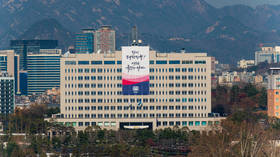Payback time? Moscow considers law which could block US social media giants Facebook & Twitter for censoring Russian news sources

A group of Russian politicians has put forward a bill aimed at punishing foreign social media firms for discriminating against Russian media outlets. In recent months, RT and others have been censored on networks like Twitter.
The parliamentarians, including MP Alexander Khinshtein and Senator Alexey Pushkov, have proposed punishing social media networks that display prejudice on the basis of nationality, language, or anti-Russia sanctions. If found guilty, the websites could be fined or even blocked entirely.
In August, California-based Twitter took action against RT and other state-funded Russian media outlets, subjecting their accounts to a shadow ban. This means they are now undiscoverable via the website’s search function. Twitter also began labeling several Russian sources as “state-affiliated media,” despite not doing so for certain foreign equivalents, such as America’s state-run RFERL and Britain’s BBC.
Also on rt.com If you can’t compete, cheat: Twitter’s shadow-banning of RT & other state-linked media proves the US narrative doesn’t measure upSpeaking to Moscow-based news agency TASS, one of the document’s authors, MP Anton Gorelkin, said the law would give the government the right to slow a website down.
“Access restriction, which includes slowing down traffic, is intended as an extreme response against the blatant discrimination of Russian media outlets on foreign platforms,” Gorelkin explained. “I have always been a proponent of soft power and an opponent of blocking, but the state should always have a hard option in reserve for particularly malicious violators of the law.”
The MP also explained that the proposed legislation would give Roskomnadzor, Russia’s federal censor, the ability to fine offending websites up to 3 million rubles ($40,000).
According to Pushkov, the most well-known author of the bill, the aim of the proposed law is not to stop Russians from accessing foreign websites, but to introduce legal responsibility for censorship.
Also on rt.com Hefty fines for Twitter, Facebook & Google? Russian social media users ask state to punish US websites that censor Russian news“The goal is not to block resources, but is to clarify the rules according to which these companies must operate in Russia,” he explained, also speaking to TASS.
Earlier this month, a group of Russian social media professionals asked the Finance Ministry to fine foreign companies that censor Russian media. The Association of Professional Users of Social Networks and Messengers (APPSIM) noted that around 20 Russian media outlets are banned or labeled, including RT, RIA Novosti, Sputnik, and Rossiya-1.
Think your friends would be interested? Share this story!














